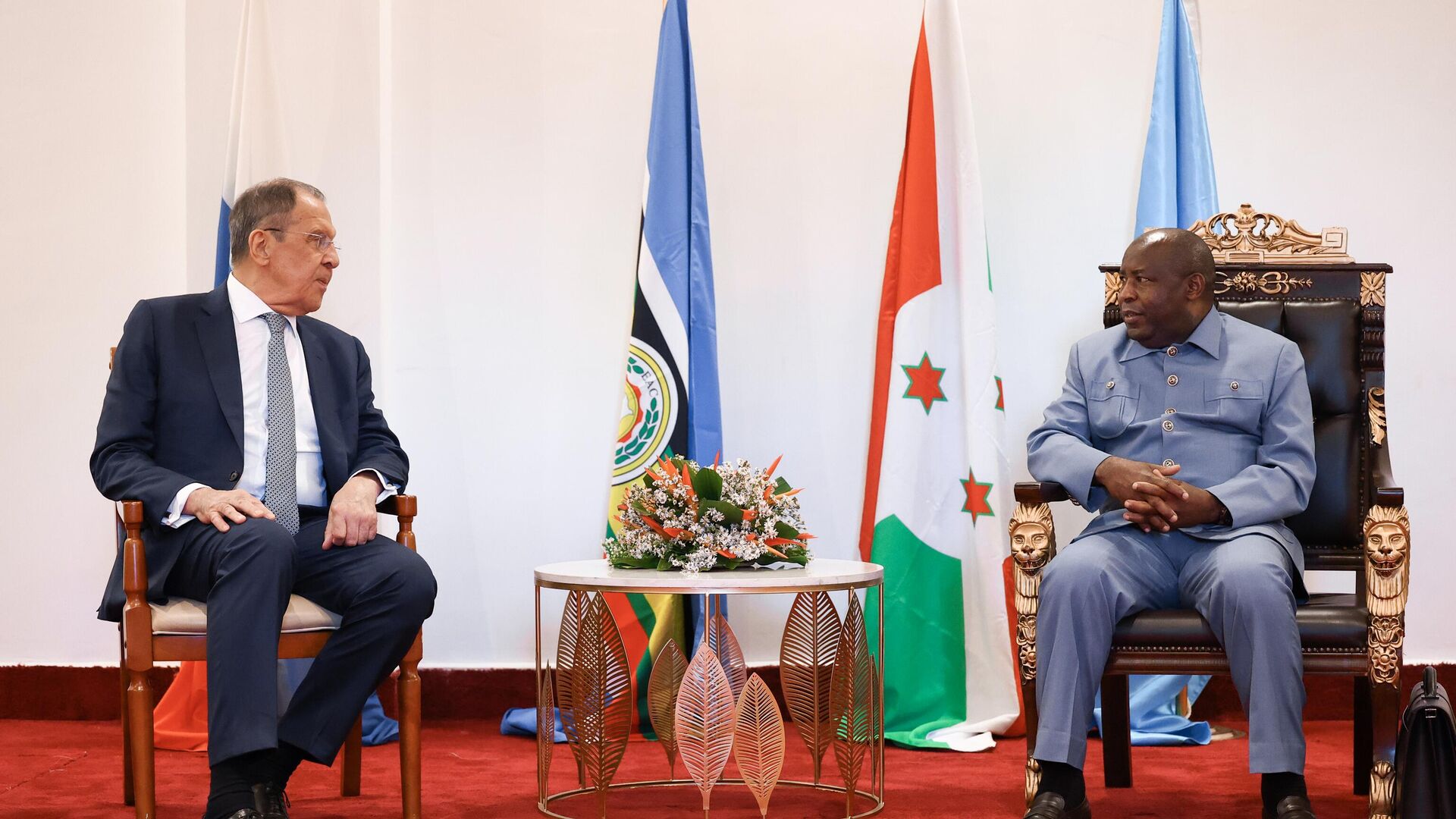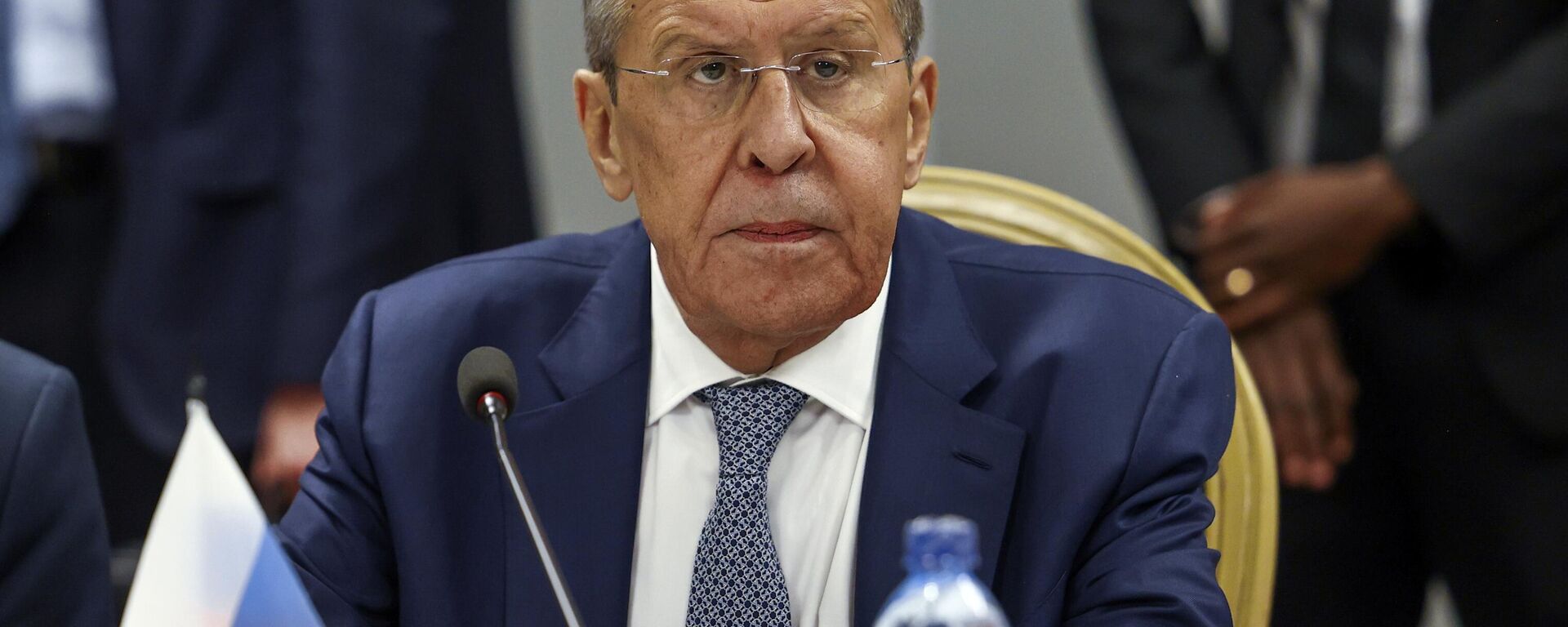https://en.sputniknews.africa/20230531/highlighting-their-colossal-significance-to-moscow-expert-on-lavrovs-visits-to-kenya-burundi-1059624605.html
Highlighting Their 'Colossal Significance' to Moscow: Expert on Lavrov's Visits to Kenya, Burundi
Highlighting Their 'Colossal Significance' to Moscow: Expert on Lavrov's Visits to Kenya, Burundi
Sputnik Africa
The visits of the Russian foreign minister to African nations hold a symbolic meaning, underscoring how important it is for Russia to maintain relations with these countries, said Maya Nikolskaya in an interview with Sputnik.
2023-05-31T18:58+0200
2023-05-31T18:58+0200
2023-06-01T11:13+0200
opinion
africa insight
kenya
east africa
burundi
foreign ministry
russian foreign ministry
sergey lavrov
russia-africa cooperation
cooperation
https://cdn1.img.sputniknews.africa/img/07e7/05/1f/1059629331_0:0:3072:1728_1920x0_80_0_0_aeb33205117bac8806f6ca02a53342e3.jpg
Apart from various practical aspects, the visits of the Russian foreign minister to African nations hold a symbolic meaning, underscoring how important it is for Russia to maintain relations with these countries, said Mayya Nikolskaya, a research fellow at the center for Middle Eastern and African Studies, Institute for International Studies, MGIMO, in an interview with Sputnik Africa. According to the researcher, one of the main goals of Lavrov's visits to Kenya and Burundi was to discuss the possible participation of the countries' leaders in the Russia-Africa summit, scheduled for July. She explained that the agenda of both visits was quite multifaceted, while part of it was publicly disclosed.Talking about the visit to Kenya, Nikolskaya stated that one of the objectives was to officially complete a number of important initiatives, such as the creation of the Intergovernmental Commission for Trade and Economic Cooperation between Russia and Kenya. She said that the formation of this commission would help to ensure that "channels of business ties between our countries are finally established."Another issue was the arrival of 34,000 tons of Russian fertilizers in Kenya. On Monday, the Russian fertilizer producer Uralchem-Uralkali Group announced that the cargo had arrived in Kenya's port of Mombasa. Comprising potash, urea, and NPKS, the donation is part of a series of shipments of fertilizers from warehouses and ports in the EU to nations experiencing food insecurity.Nikolskaya stated that amid rising prices of staple foods and increasing costs of imports, Kenya's government is looking for cheaper options for fertilizers and seeds, and is therefore in dire need for Russian fertilizers. She recalled that last year, Kenya lifted its longstanding ban on genetically modified corn, demonstrating "how difficult the situation is."The expert stated that Kenya is more likely to be classified as a neutral country in relation to Moscow, underlining that relations between the two nations are actively developing.Speaking about Burundi, Nikolskaya stated that the country is a traditional partner of Russia in the region of Central and East Africa. Noting that Russia can offer various development projects to these countries, she recalled that Burundi is already developing a joint project with Russia. The latter has opened a new laboratory in the East African country within the National Center for Public Health, where biologists from the Russian Research Institute of Epidemiology of Rospotrebnadzor are currently working, studying Ebola and other infectious diseases.As for the political agenda, she highlighted that Russia is supporting African nations in their efforts to promote reforms within the UN. According to Nikolskaya, the country is helping in "every possible way," trying to declare on all international platforms that it supports the African position on this issue.In particular, earlier this month, Kenyan President William Ruto called for reform of the United Nations Security Council (UNSC), stating that Africa deserves at least two permanent seats on the council. He noted that even though the UN is a crucial forum for global diplomacy, Africa has been significantly disadvantaged. Ruto reiterated the need for reform to ensure that this imbalance is eliminated, while the continent's voice is heard and given equal weight on the global stage.
https://en.sputniknews.africa/20230529/over-30000-tonnes-of-russian-fertilizers-arrive-in-kenya-1059572732.html
https://en.sputniknews.africa/20230530/west-directly-supports-genocide-of-russians-by-kiev-regime-lavrov-says-1059596480.html
kenya
east africa
burundi
Sputnik Africa
feedback@sputniknews.com
+74956456601
MIA „Rossiya Segodnya“
2023
News
en_EN
Sputnik Africa
feedback@sputniknews.com
+74956456601
MIA „Rossiya Segodnya“
Sputnik Africa
feedback@sputniknews.com
+74956456601
MIA „Rossiya Segodnya“
east africa, kenya, nairobi, burundi, cooperation, russian foreign ministry, sergey lavrov, lavrov's visit to kenya, president of burundi evariste ndayishimiye, bujumbura
east africa, kenya, nairobi, burundi, cooperation, russian foreign ministry, sergey lavrov, lavrov's visit to kenya, president of burundi evariste ndayishimiye, bujumbura
Highlighting Their 'Colossal Significance' to Moscow: Expert on Lavrov's Visits to Kenya, Burundi
18:58 31.05.2023 (Updated: 11:13 01.06.2023) Earlier this week, Russian Foreign Minister Sergey Lavrov embarked on his fourth tour of the African continent in the past year, visiting three African nations so far, including Kenya, Burundi, and Mozambique. During the visits, the minister held talks with the countries' leadership to discuss their cooperation with Russia and international issues.
Apart from various practical aspects, the visits of the Russian foreign minister to African nations hold a symbolic meaning, underscoring how important it is for Russia to maintain relations with these countries, said Mayya Nikolskaya, a research fellow at the center for Middle Eastern and African Studies, Institute for International Studies, MGIMO, in an interview with Sputnik Africa.
According to the researcher, one of the main goals of Lavrov's
visits to Kenya and Burundi was to discuss the possible participation of the countries' leaders in the Russia-Africa summit, scheduled for July. She explained that the agenda of both visits was quite multifaceted, while part of it was publicly disclosed.
"But there is also a symbolic dimension to the tour. The visit in person by the Minister of Foreign Affairs, with several dozen delegates accompanying him, emphasizes the major significance that Russia attaches to relations with these countries," she said.
Talking about the visit to Kenya, Nikolskaya stated that one of the objectives was to officially complete a number of important initiatives, such as the creation of the Intergovernmental Commission for Trade and Economic Cooperation between Russia and Kenya. She said that the formation of this commission would help to ensure that "channels of business ties between our countries are finally established."
Another issue was the arrival of 34,000 tons of Russian
fertilizers in Kenya. On Monday, the Russian fertilizer producer Uralchem-Uralkali Group announced that the cargo had arrived in Kenya's port of Mombasa. Comprising potash, urea, and NPKS, the donation is part of a series of shipments of fertilizers from warehouses and ports in the EU to nations experiencing food insecurity.
Nikolskaya stated that amid rising prices of staple foods and increasing costs of imports, Kenya's government is looking for cheaper options for fertilizers and seeds, and is therefore in dire need for Russian fertilizers. She recalled that last year, Kenya lifted its longstanding ban on genetically modified corn, demonstrating "how difficult the situation is."
The expert stated that Kenya is more likely to be classified as a neutral country in relation to Moscow, underlining that relations between the two nations are actively developing.
"Even though pro-Ukrainian sentiments are certainly strong there, nevertheless, the Kenyan leadership has recently joined the position of the African Union on the Ukrainian crisis, which is to call on both sides for peace and to seek a diplomatic solution," she said.
Speaking about
Burundi, Nikolskaya stated that the country is a traditional partner of Russia in the region of Central and East Africa. Noting that Russia can offer various development projects to these countries, she recalled that Burundi is already developing a joint project with Russia. The latter has opened a new laboratory in the East African country within the National Center for Public Health, where biologists from the Russian Research Institute of Epidemiology of Rospotrebnadzor are currently working, studying Ebola and other infectious diseases.
As for the political agenda, she highlighted that Russia is supporting African nations in their efforts to promote
reforms within the UN. According to Nikolskaya, the country is helping in "every possible way," trying to declare on all international platforms that it supports the African position on this issue.
In particular, earlier this month, Kenyan President William Ruto called for reform of the United Nations Security Council (UNSC), stating that Africa
deserves at least two permanent seats on the council. He noted that even though the UN is a crucial forum for global diplomacy, Africa has been significantly disadvantaged. Ruto reiterated the need for reform to ensure that this imbalance is eliminated, while the continent's voice is heard and given equal weight on the global stage.



